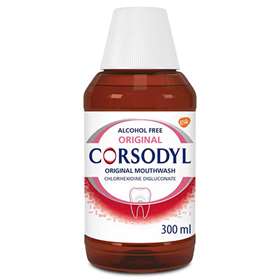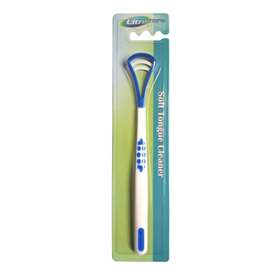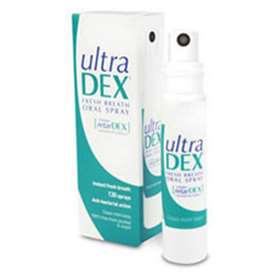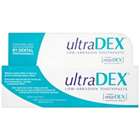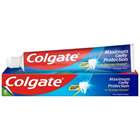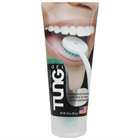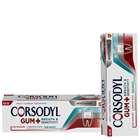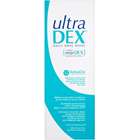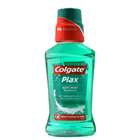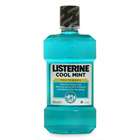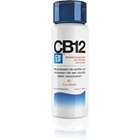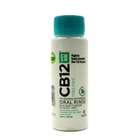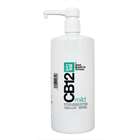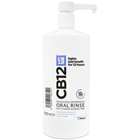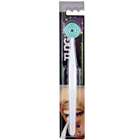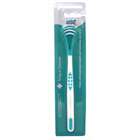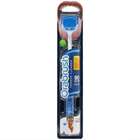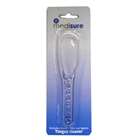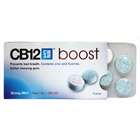• What is bad breath?
Bad breath (Halitosis) is caused by bacteria that grow in the mouth and accumulate on food particles left behind on the teeth and tongue. These bacteria release sulphur compounds which make your breath smell bad.
• Why do I get bad breath?
Smoking, strong foods, bad oral hygiene, dry mouth, gum disease, sinus conditions and wearing dentures can all cause bad breath. Here's why:
- Oil from strong smelling foods can linger and remain on the breath for a while after you've eaten. The oil is absorbed into your blood and carried through your lungs and out onto your breath.
- Bad oral hygiene (which can lead to gum disease) means that bacteria have plenty of food particles to live on. Use a mouthwash like Oraldene to kill bacteria.
- A dry mouth will allow bacteria to flourish on food particles as saliva is needed to wash bacteria away - see our dry mouth page.
- Tar and nicotine from cigarettes gathers on the surface of the mouth, which cause smokers breath. Smoking also dries out your mouth which can lead to bad breath. Maybe try a chewing gum from Nicorette to help kick the habit and keep the mouth fresh and moist.
- Sinus conditions can cause bad breath too as discharge can drip down from the nasal passage to the back of the throat offering bacteria another protein to live on - keep your sinus clear with Sterimar or NeilMed.
- Dentures offer bacteria another surface to thrive on and can trap food between them and your mouth. Clean your dentures well with cleansers like Steradent.
• How do I treat bad breath?
Maintain a good oral health routine:
- Brush teeth for at least 2 minutes, twice a day, concentrating around the gumline and behind teeth. Try cleaning with an antibacterial toothpaste such as Optima Tea Tree Fresh & White or Euthymol.
- Most breath odour is due to bacteria that live on the tongue, so make sure you use a tongue cleaner as well.
- Rinse with an antibacterial mouthwash such as Dentyl, or use an anti-odour mouthwash like UltraDEX.
- Use Dental Floss between teeth to remove hard to reach plaque and trapped food particles.
Products form the
Retardex and
Dentek range are all specially designed to combat bad breath. An
electric toothbrush may offer a better clean than a manual one.
•
My breath smells but I can't smell it, why is this?
The oral cavity and nasal passage are linked at the back of our throat and as our nose is designed to filter out and ignore constant background smells. This means that any breath odour will go unnoticed. This is how it is possible to have bad breath and not know it! The easiest way to test your breath is to lick your wrist, let it dry and take a sniff! Smell nice? It might be worth taking a look at some
UltraDex products if not!
•
I get really bad morning breath, how can I stop this?
Breath odour when you first wake up is normal and happens because the mouth and tongue dry out whilst you're sleeping. This allows bacteria to accumulate on food residue and a stale smell is released as a result of this. Make sure you brush your teeth before bed and use an antiseptic mouthwash such as
Listerine to prevent bad morning breath.
People who suffer from open mouthed snoring may notice they have particularly bad morning breath as their mouth may dry out more than others - see our
Snoring Prevention page!
•
I always brush my teeth but I still have bad breath, what else can I do?
Try a mouth spray such as
UltraDex Fresh Breath Oral Spray to keep your breath fresh through the day. Try to work out what is causing your bad breath - do you drink coffee or smoke? Persistent bad breath may be a sign of gum disease or a sinus condition, see your doctor or dentist if you think this may be the case.


